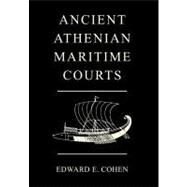Ancient Athenian Maritime Courts
, by Cohen, Edward E.- ISBN: 9781584776611 | 1584776617
- Cover: Hardcover
- Copyright: 8/31/2008
Cohen, Edward E. Ancient Athenian Maritime Courts. Princeton: Princeton University Press, [1973]. xii, 233 pp. Reprinted 2005, 2010 by The Lawbook Exchange, Ltd. ISBN-13: 9781584776611. Hardcover. New. $85. * Athens was the dominant maritime power in the West from the eighth to fourth centuries BCE. Athenian preeminence insured that its maritime law was accepted throughout the Mediterranean world. Indeed, its influence outlasted Athens and is the only area of classical Greek law that wasn't replaced entirely by Roman models. Codified during the Roman period in the Rhodian Sea laws, it went on to influence the subsequent development of European commercial and maritime law. Using both ancient and secondary sources, Cohen explores the development of Athenian maritime law, the jurisdiction and procedure of the courts and the Athenian principles that have endured to the present day. He successfully treats the much-discussed problem of why they were termed "monthly" and describes how "supranationality" was a feature of all Hellenic maritime law. He goes on to show how their jurisdiction was limited ratione rerum, not ratione personarum, because a legally defined "commercial class" did not exist in Athens at this time. Classicists and lawyers alike will find this a fascinating study that shows how certain principles of Athenian maritime law are still imbedded in the modern international law of maritime commerce. Cohen has made a unique and substantial contribution to our understanding of the Athens of Plato, Aristotle and Demosthenes.






